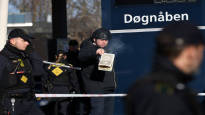Denmark is now experiencing several Koran burnings every day, which is leading the country into unpredictable foreign policy difficulties.
The Danish government is currently considering how to prevent the burning of the Koran in the country, which especially the extreme right-wingers have done in recent days to provoke Muslim backlash.
Foreign minister Lars Løkke Rasmussen said on Monday morning, when he went to the board meeting, that with the help of laws of order, it would be possible to ban the burning of the Koran, at least in front of foreign embassies.
After the meeting, Rasmussen was frustrated, because the regional regulation regarding the embassies’ representatives would hardly be enough to calm the situation, because the book can be burned anywhere and the act made public on the Internet.
– This will not change if the burning of the Koran in front of a foreign mission is prohibited, but the same thing would be allowed [Kööpenhaminan] At the town hall square and its live streaming, he stated In an interview with Danish TV2.
According to Rasmussen, there is a crisis at hand that is out of control. The OIC, a grouping of Islamic countries, is meeting to consider countermeasures against Denmark.
Denmark wanted to allow the burning of the Koran
Banning the burning of the Koran would be politically very difficult, especially for Denmark, says the professor of criminal law at the University of Helsinki Kimmo Nuotio.
In Denmark, like in many other countries as wella law prohibiting blasphemy has been in force.
– A few years ago, a video of burning the Koran went viral in Denmark. It raised the question of whether this regulation should still be applied, Nuotio says.
In 2017, the blasphemy law was removed from Danish law.
– In Denmark, they wanted to emphasize very broad freedom of expression. At that time, it was also not possible to foresee that the burning of the Koran would become such a widespread phenomenon as it has been seen now.
Concepts of religion have changed
Blasphemy legislation dates back hundreds of years. Also in Sweden-Finland, criminalization was in the 1734 law, and it was known even before that, Nuotio recalls.
– Originally, blasphemy was forbidden because it was feared that God himself would avenge the mockery on the whole community. Since then, religious perceptions have changed and blasphemy laws have been repealed in many countries.
In Finland, the blasphemy statute was changed in 1998 to a statute that prohibits violating religious peace. It prohibits slandering and dishonoring things held sacred by the church or religious communities. On this basis, for example, burning the Koran is prohibited in Finland.
Professor Nuotio says that he has criticized the section of the Finnish law regarding the violation of religious peace, because it restricts freedom of speech on an already outdated basis. Now the law has proven to be useful in terms of foreign policy in a way that the legislator could not have expected.
In the new situation, Denmark has to find a way to hold on to freedom of expression at the same time, but at the same time it should be able to convince Islamic countries that religious conviction will not be violated.
More on the topic:
On Monday morning, Radio Suomen Päivä discussed the reaction of Islamic countries to the burning of the Koran in Denmark.
Swedish public radio SVT tells how Swedish law treats Koran burning.
